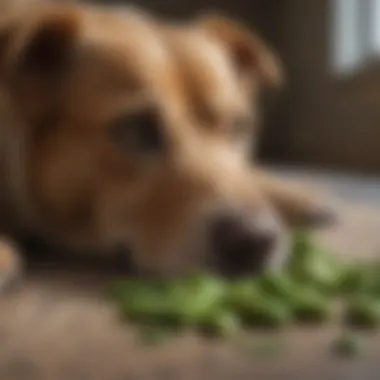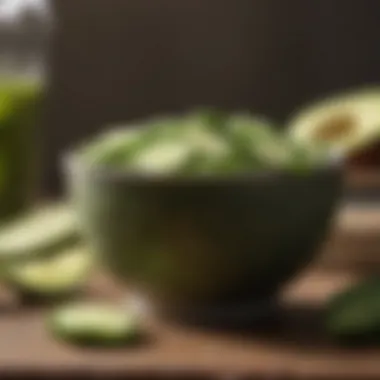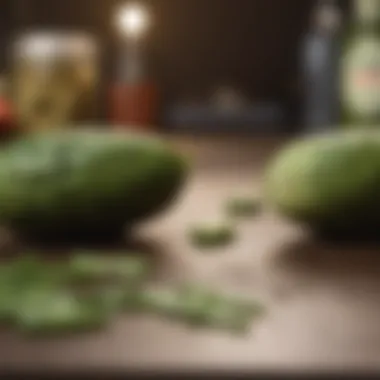Can Dogs Eat Dill Pickles? Essential Insights for Pet Owners


Intro
Understanding what our pets can safely eat is critical for their health. As pet owners, we often find ourselves curious about sharing our meals, including unconventional items like dill pickles. Dill pickles, known for their tangy flavor, are popular in many cuisines, but this raises the question: Can dogs eat dill pickles? This article aims to explore whether it’s safe for dogs to consume these pickled treats and what implications there may be for their health.
Animal Profile
General Overview
Dogs are characterized by their domestication from wolves, tailored to live alongside humans for companionship and work. They have evolved from their wild ancestors to adapt to various environments, making them resilient and diverse in nature. Their dietary requirements are influenced by factors such as breed, age, and overall health.
Habitat and Distribution
The domestic dog is found in homes across the globe, unlike their wild ancestors. They thrive in human environments, adapting to various living conditions, whether in urban settings or rural areas. This adaptability also plays a crucial role in their diets, allowing them to digest a wide range of food, albeit with some limitations.
Fascinating Facts
Unique Traits and Adaptations
Dogs possess an acute sense of smell and hearing. These acute senses help them in various activities from hunting to companionship. Additionally, dogs have a unique ability to digest certain human foods better than others, which varies between individual dogs.
Historical and Cultural Significance
Throughout history, dogs have played significant roles in human societies, from hunting partners to loyal companions. Their roles have shaped perceptions and cultural significance, often highlighting the bond between dogs and humans.
Conservation Status
Current Population Trends
While not a wild species, domestic dogs face issues regarding overpopulation and abandonment. Pet adoption and responsible breeding practices are essential to prevent the negative trends in dog populations.
Threats and Challenges
Abandonment, neglect, and lack of education around pet care are prevalent threats. Moreover, health issues related to diet can impact their well-being.
Care Tips for Pet Owners
Basic Needs and Requirements
Proper nutrition is vital for maintaining a dog’s health. Dogs require a balanced diet that includes proteins, fats, carbohydrates, vitamins, and minerals. It is essential to be informed about which human foods are safe to share with them.
Health and Wellness Tips
To ensure your dog remains healthy, frequent vet visits are necessary. Keeping vaccinations up to date, providing regular exercise, and maintaining a healthy diet contribute to a long, healthy life for your canine friend.
Understanding the implications of sharing food, such as dill pickles, is crucial.
Consider factors like sodium content and potential digestive issues before sharing such treats.
Understanding Dill Pickles
Understanding dill pickles is essential for pet owners who are curious about including them in their dog's diet. This section provides insight into what dill pickles are, how they are made, and the components that might affect canine health. Given that human foods often find their way into pet diets, being informed about these foods helps in making safer choices for our furry companions.
Definition of Dill Pickles
Dill pickles are cucumbers that have been preserved in a brine solution, typically containing water, vinegar, and various seasonings. The process of pickling not only extends the shelf life of cucumbers but also adds a distinct flavor profile that many people enjoy. While dogs may find these flavors interesting, their safety and health impacts warrant thorough consideration.
Ingredients of Dill Pickles
Vinegar
Vinegar is a crucial ingredient in dill pickles. It helps to create the tangy flavor that characterizes pickles. In this article, vinegar's role is primarily about preservation. It is acidic, which can inhibit the growth of harmful bacteria. However, this acidity can be problematic for dogs, especially if consumed in large amounts.


Sodium
Sodium is another significant component of dill pickles. Often found in the brine, sodium levels can be quite high, depending on the recipe. Dogs have a different sodium tolerance compared to humans. While small amounts might not be immediately harmful, excessive sodium can lead to health issues such as increased blood pressure and dehydration. Thus, monitoring sodium intake is vital for canine health.
Spices
Spices are used to enhance the flavor of dill pickles. Common spices include dill, garlic, and mustard seeds. While some spices may be safe for dogs in moderation, certain spices can be harmful. For example, garlic is known to be toxic to dogs and can cause gastrointestinal upset or more severe health issues. Pet owners must exercise caution regarding which spices are included in the pickles.
Cucumbers
Cucumbers are the primary ingredient in dill pickles and are generally safe for dogs. They are low in calories and provide hydration. However, when transformed into pickles, the benefits may diminish due to the added ingredients. Understanding this shift in nutritional value is fundamental when considering if dogs can consume dill pickles.
It’s crucial to understand the impacts of each ingredient in dill pickles before offering them to dogs. The balance of flavors and preservatives might not suit canine dietary needs.
Can Dogs Eat Dill Pickles?
Understanding the question of whether dogs can eat dill pickles is vital for many pet owners. As dogs often share mealtime space with their human companions, the potential risks and benefits of introducing new foods warrant careful consideration. Dill pickles are common in many households, but their suitability for canine diets requires examination. This section imparts knowledge that could foster better interactions between dogs and their owners during meal times, guiding pet owners towards informed dietary decisions.
Analyzing Safety
When assessing if dogs can safely consume dill pickles, it is crucial to focus on the composition of the pickles. The ingredients play a significant role in determining whether it’s safe or advisable for dogs. Dill pickles typically contain cucumbers, vinegar, and various spices. Each of these components has different effects on a dog's health, necessitating a thorough evaluation.
Potential Health Risks
Sodium Content
One primary concern with dill pickles is their sodium content. Dill pickles often contain high levels of sodium due to the brining process. Sodium is an essential electrolyte in dogs, but excessive intake can lead to harmful health effects. A diet high in sodium can cause dehydration and hypertension in dogs. Therefore, offering dill pickles as snacks should be approached with caution, ensuring that their overall diet remains balanced and low in sodium to avoid potential complications.
Vinegar Effects
Vinegar is another significant ingredient in dill pickles. It is often used for its preservative properties and distinctive taste. While vinegar can aid digestion in small amounts, it can also irritate a dog’s stomach and digestive system, especially if consumed in larger quantities. This aspect makes it essential for pet owners to consider the properties of vinegar and how their dogs might react to this ingredient. Moreover, introducing vinegar to a dog's diet should be done slowly and carefully.
Spices and Additives
The inclusion of various spices and additives in dill pickles raises additional concerns. Not all spices are dog-friendly, and some can cause gastrointestinal upset or allergic reactions. Common spices found in dill pickles, such as garlic and onion, are toxic to dogs. Pet owners must be vigilant about the specific spices present in the pickles they consider offering to their dogs. Each spice presents unique risks that could potentially disrupt a dog's well-being. Thus, understanding the components of pickles is crucial for evaluating their appropriateness as a canine treat.
Dill pickles may seem like a harmless snack, but their high sodium content, vinegar effects, and potentially harmful spices necessitate cautious contemplation before sharing them with dogs.
Nutritional Value of Pickles for Dogs
Understanding the nutritional value of pickles, specifically dill pickles, is essential for pet owners considering introducing such foods to their dog's diet. While many people enjoy pickles for their taste and potential health benefits, it is important to recognize that dogs have different nutritional needs. By examining the nutritional value of pickles for dogs, one can determine if they provide any benefits or pose any risks.
Basic Nutritional Needs
Dogs require a balanced diet that includes proteins, fats, carbohydrates, vitamins, and minerals. Each of these nutrients plays a crucial role in maintaining a dog's overall health. Proteins are essential for muscle development and repair, while fats provide energy and aid in nutrient absorption. Carbohydrates contribute to energy, though they should not make up the majority of a dog's diet. Vitamins and minerals support various bodily functions and help in the development of a healthy immune system.
When considering human foods like pickles, it is crucial to evaluate whether these foods can contribute to fulfilling these basic nutritional needs. In general, pickles do not serve as a significant source of essential nutrients required by dogs.
Comparative Analysis
Evaluating pickles against other vegetables allows for a better understanding of their role in a dog's diet.
Pickles vs.
Other Vegetables
Dill pickles are generally cucumbers that have been preserved in vinegar and seasoned with spices. Compared to fresh vegetables, pickles lack critical nutrients and hydration. Fresh options like carrots and peas provide fiber, vitamins, and hydration, key components that pickles do not offer due to their processing.
Pickles' high sodium content can lead to dehydration and other health complications in dogs if consumed in significant amounts. Therefore, while pickles may be a unique taste experience for dogs, their overall nutritional contribution is minimal and potentially harmful.
Dog-Specific Nutritional Choices


When it comes to selecting foods for dogs, it is essential to explore dog-specific nutritional choices. These foods are specially formulated to meet canine dietary requirements. Unlike pickles, dog food contains required proteins, fats, and essential vitamins that contribute to sustaining a dog's health over time.
Moreover, dog-specific treats often prioritize ingredients such as natural meats, whole grains, and vegetables that are safe and beneficial for dogs. Ultimately, these treats provide the necessary nutrients while avoiding potentially harmful additives often found in human foods like pickles.
Dogs thrive best on diets designed for their specific dietary needs. Offering them pickles lacking essential nutrients may do them more harm than good.
In summary, while dill pickles may seem like an intriguing snack, they do not align with the nutritional requirements necessary for dogs. The exploration of alternatives, such as fresh vegetables or specially formulated dog treats, is recommended. This ensures that dogs receive the beneficial nutrients they need to thrive while avoiding any health risks associated with inappropriate human foods.
How to Introduce New Foods to Dogs
Introducing new foods into a dog's diet requires caution and an informed approach. This section is vital in the context of determining if dill pickles are safe for dogs. Understanding how to methodically introduce new foods can mitigate potential health risks and promote a balanced diet. It allows pet owners to identify any allergies or sensitivities their dogs might have, ensuring that the dog's overall health and nutrition remain optimal.
Gradual Prelude
The process of incorporating new foods should be gradual. A sudden change in diet can lead to digestive upset or other health issues. Start by offering a small amount of the new food, such as a piece of dill pickle. Monitor the dog's response over a few days before increasing the amount. This method allows the dog’s digestive system to adjust to the new food.
- Start Slow: Begin with a small bite.
- Increase Gradually: If the dog tolerates the new food, slowly increase the quantity.
- Consider Other Foods: Always compare how the dog reacts to new foods versus familiar ones.
Observing Reactions
After introducing dill pickles, it’s crucial to observe the dog's reactions closely. Look for signs of discomfort or adverse reactions. You want to monitor not only physical symptoms but also behavioral changes. Possible symptoms to watch for include:
- Digestive Issues: Such as vomiting or diarrhea.
- Allergic Reactions: Including itching or swelling.
- Behavioral Changes: Signs of lethargy or excitement could indicate how well the dog tolerates the food.
If any negative reactions occur, stop feeding the new food and consult a veterinarian. Keeping a diary of what your dog eats can be helpful in understanding any patterns related to their diet.
Patience and observation are key when introducing any new food to your dog's diet.
Common Misconceptions About Dog Diets
Understanding common misconceptions about dog diets is essential for pet owners to make informed choices about their canine companions. These misconceptions can lead to harmful practices and can negatively impact a dog's health. Many pet owners mistakenly believe that dogs can safely eat any human food, resulting in potential dietary issues or even toxicity. By identifying and dispelling these myths, pet owners can better navigate their dog's nutrition and well-being.
Myths About Human Food
One prevalent myth is that all human foods are safe for dogs. This notion can be dangerous, considering that dogs metabolize foods differently than humans. Certain ingredients commonly found in our diets can be hazardous for canines. For example, foods containing chocolate, garlic, and onion are toxic to dogs and should be strictly avoided. Owners might think a small taste of something is harmless, but even minimal exposure can lead to serious health issues.
Another misunderstanding is the belief that dogs thrive on a grain-free diet. While some dogs may benefit from such diets, they are not universally suitable. In fact, many commercial dog foods contain grains that provide necessary nutrients and energy. Eliminating grains without proper research could lead to nutritional deficiencies. Thus, it's crucial to consult with a veterinarian before making significant changes to a dog's diet.
Additionally, some dog owners think that feeding table scraps is an acceptable practice. While sharing occasional healthy human foods in moderation can be fine, this habit can lead to obesity and behavioral problems in dogs. Healthy options should be prioritized over high-fat, high-sodium foods that are typical in human diets.
In summary, awareness of these myths can help dog owners avoid dangerous dietary mistakes and provide a balanced, safe diet for their pets.
Understanding Canine Digestive Systems
The canine digestive system is notably different from that of humans, emphasizing the need for careful consideration of dietary choices. Dogs are omnivores, but their ability to digest various foods varies significantly. Their shorter digestive tracts lead to less time for food breakdown and absorption, which is vital to remember when offering new items like dill pickles.
Dogs possess a much higher concentration of certain digestive enzymes that help them process protein, yet they lack some enzymes that help digest complex carbohydrates. This is one reason certain foods, including those with high sugar or carbohydrate content, may not be well-suited for their diet. Moreover, the pH level of a dog's stomach is more acidic, which aids in the digestion of meat but can also affect how certain other foods are processed.
It’s essential for pet owners to respect these physiological differences when considering new foods for dogs.
Understanding these digestive characteristics allows for safer choices when introducing human foods. Owners should focus on dog-specific nutrition to ensure optimal health. Consulting a veterinarian or a specialized nutritionist can provide insights tailored to individual dogs, considering their age, breed, and health status.
By taking the time to understand canine digestive systems, pet owners can reduce the risk of gastrointestinal issues and ensure their dogs lead healthy, happy lives.
Alternatives to Dill Pickles for Dogs
Dill pickles may seem like a unique snack for dogs, but it is important to consider healthier and safer alternatives. Dogs thrive on a balanced diet that aligns with their nutritional needs. While dill pickles can offer some intriguing flavors, the inherent risks often outweigh the benefits. Therefore, exploring alternative dog snacks is both relevant and essential. These alternatives not only fulfill the dog's craving for a treat but also provide necessary nutrients without the added risk.
Healthy Treat Options
Carrots


Carrots are a smart choice for dog treats. They are low in calories and high in fiber, making them a safe snacking option. The crunchiness of carrots appeals to dogs, and their natural sweetness can be satisfying. Carrots contain beta-carotene, which converts to vitamin A in the body. This vitamin supports eye health and can boost overall immune function. Furthermore, carrots can help in maintaining dental health by reducing plaque and tartar buildup during chewing.
One downside is the potential for choking if carrots are not sliced into appropriate sizes. It is best to cut them into manageable pieces, especially for small dogs. Overall, carrots represent a beneficial choice that aligns with the nutritional goals of this article.
Green Beans
Green beans offer another excellent alternative to dill pickles. They are rich in vitamins A, C, and K, which are beneficial for overall health. Dogs tend to enjoy the crunchy texture, making them an appealing snack. Green beans are also high in fiber, promoting digestive health. This helps dogs feel full, which can be advantageous for those needing weight management.
One unique feature of green beans is their versatility. Dogs can enjoy them raw, steamed, or even as part of homemade dog treats. However, it is important to avoid canned green beans with added salt or preservatives. Overall, they provide significant nutritional value without the risks associated with pickles.
Pumpkin
Pumpkin is another recommended treat for dogs. It is packed with nutrients like beta-carotene, fiber, and various vitamins. This food is particularly beneficial for digestive health. The fiber in pumpkin can help to regulate a dog's digestion, making it an excellent choice for both constipation and diarrhea. Moreover, pumpkin has a mild flavor that most dogs find palatable.
What sets pumpkin apart is its low calorie count. It allows dog owners to treat their pets without fear of weight gain. However, it is crucial to always choose plain canned pumpkin—avoid sugary or flavored varieties. Overall, pumpkin serves as a popular and beneficial option in the discussion of alternatives to dill pickles.
Store-Bought Alternatives
In addition to fresh produce, there are several store-bought options available for dog owners. Many brands provide well-balanced dog treats that cater to various dietary needs. These treats can include fish, chicken, and even peanut butter, ensuring flavor variety. Many of these store-bought alternatives are specifically formulated to be low in sodium and free from harmful additives.
Selecting the right dog treat involves evaluating the ingredients list carefully. Always look for high-quality proteins and limited additives. It is essential to choose brands that prioritize canine health over profits. Checking the labels can prevent potential health risks, ensuring the chosen alternatives are safe and nutritious for dogs.
Consulting with a Veterinarian
Consulting with a veterinarian is crucial for any pet owner considering changes to their dog's diet. A veterinarian can provide expert guidance tailored to the specific health needs and dietary requirements of the dog. They understand the nuances of canine nutrition and can help assess whether a certain human food, such as dill pickles, is appropriate for your pet.
It is worth noting that each dog's health and dietary needs may vary significantly based on factors like age, breed, size, and existing medical conditions. A trained professional can evaluate these elements to offer personalized recommendations.
The potential for health issues related to certain food items cannot be overlooked. Some dogs may have sensitives to specific ingredients found in dill pickles, which may not be apparent without professional advice. Consulting with a veterinarian helps mitigate risks and ensures that any food introduced aligns with the dog’s health profile.
Importance of Professional Guidance
Professional guidance is essential in navigating the complexities of canine nutrition. A veterinarian's expertise can uncover essential details about a dog’s health status and dietary restrictions. With their training, veterinarians can identify potential risks associated with human foods, making them a critical resource.
Here are some benefits of seeking advice from a veterinarian:
- Tailored Recommendations: Each dog is different. A vet can customize suggestions based on the dog’s specific needs.
- Health Monitoring: Regular consultations can help track any adverse reactions as new foods are introduced.
- Nutritional Expertise: Vets have a deep understanding of vitamins, minerals, and other dietary constituents vital for canine health.
When to Seek Advice
Knowing when to consult a veterinarian can significantly impact a dog's well-being. Pet owners should consider reaching out when:
- Introducing New Foods: If you plan to add dill pickles or any other food to your dog's diet, professional advice is prudent to avoid adverse effects.
- Observing Unusual Behavior: If a dog displays signs of distress or discomfort after consuming a new food, immediate consultation is necessay.
- Existing Health Issues: Puppies or dogs with chronic ailments should have their diet monitored closely.
Closure
Understanding the implications of giving dill pickles to dogs is essential for responsible pet ownership. This article has explored various key aspects surrounding dill pickles, including their ingredients, potential health risks, and appropriate alternative treats. Not only does this enhance our comprehension of what constitutes a healthy diet for dogs, but it also emphasizes the importance of balance in canine nutrition.
By synthesizing the insights gathered throughout the article, it becomes evident that while sharing human food with pets can be tempting, one must do so with caution and knowledge. Several factors, such as sodium content, type of spices used, and the individual dog's tolerance level, play a crucial role in determining safety. Therefore, a well-informed conclusion is vital in navigating these choices effectively.
"The health of your furry companion depends on what you choose to feed them. Knowledge is key to making better decisions."
In light of these findings, pet owners are urged to reflect on their options and closely monitor what they are feeding their dogs. This not only promotes overall health but also aids in preventing potential adverse reactions associated with inappropriate food choices.
Summary of Findings
The investigation into whether dogs can consume dill pickles reveals several important insights:
- Ingredients Matter: The vinegar, sodium, and spices in dill pickles can pose risks to dogs.
- Health Risks: Elevated sodium levels can affect their hydration, while vinegar may upset their stomach.
- Nutritional Needs: Dogs thrive on a balanced diet, where alternative treats can serve better nutritional purposes than pickles.
These findings demonstrate a clear need for caution when considering human foods for dog consumption. Emphasis should be placed on canine dietary needs over the fleeting pleasure of sharing snacks.
Final Recommendations for Pet Owners
- Prioritize Safety: Always consult a veterinarian before introducing new foods into your dog’s diet.
- Monitor Reactions: If offering any new food, including dill pickles, watch for signs of discomfort or adverse reactions.
- Opt for Alternatives: Consider healthier snacks like carrots, green beans, and pumpkin instead of pickles.
- Stay Informed: Education on canine nutrition is vital; understand what your pet requires for optimal health.
Following these recommendations creates a safer environment for your pet and fosters a thoughtful approach to their nutrition. Ultimately, being informed is part of being a responsible pet owner.















